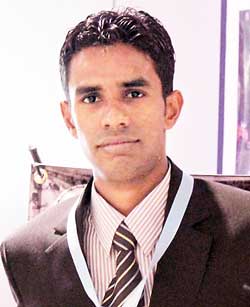Tuesday Feb 24, 2026
Tuesday Feb 24, 2026
Wednesday, 11 May 2016 00:00 - - {{hitsCtrl.values.hits}}
To increase political participation for youth and women within the country, priority should be given to provide grass roots level opportunities for youth and women displaying true leadership personalities
By Sachinda Dulanjana
Considered from any angle the fact that 23.2% of the population (constituting of 4.64 million individuals) is comprised of youth (those between 15-29 years of age) is an advantageous factor for any country. This may not be so for Sri Lanka. In Sri Lanka, youth (who should be a key group looking to address the issues facing the nation and contributing to accelerate the development process) are sadly caught up in their daily struggles, with no clear idea of where they need to go.
Taking into account various factors such as education, unemployment, health, social integration and the post-war rehabilitation process, youth caught up in personal struggles can even be classified as a vulnerable group within the present society. Therefore it is not a surprise that youth are facing barriers in the way of their direct participation within the democratic process to take decisions regarding the development of the country.
However, the negative impacts of the absence of youth contribution in taking decisions related to development can be easily observed. The youth of a country being the beneficiaries and not the decision makers of solutions taken on behalf of their issues means that finding sustainable solutions that suit the needs of youth is not an easy task.
Youth know best the various issues and problems they face. Therefore the solutions to these problems should be derived with their participation rather than through those who provide token representation on behalf of youth. What needs to happen is to ensure direct participation of youth in a country’s decision making process. Other than advocacy, the best way to ensure this is direct political participation among youth in the present political system.
According to the 2014 National Human Development Report for Sri Lanka (NHDR) although 71.5% of youth in Sri Lanka exercise their right to vote, only a small fraction is directly engaged in politics through activism within political parties and trade unions. Furthermore, the fact that 17.7% of youth do not exercise their voting rights and/or participate in any political activity is also a cause for concern.
Statistics aside, political participation of women and youth is an important subject that came to the fore during the previous election. Whether the current minute representation of youth and women in national politics is a true representation of the thoughts and needs of the wider society is a subject worthy of further discussion. Therefore I leave that aside for the moment.
However, the pre-election process in the country and the active participation of women and youth in the previous election campaigns of political parties within the democratic process of Sri Lanka presents a fine prelude to this subject. Specifically, the ability of youth (who are conversant with 21st century technology) to influence the political direction of the country through engagement in avenues such as social media, etc. came up for wide discussion during both the presidential and parliamentary elections held last year.
As mentioned above, whilst the NHDR 2014 revealed that direct political engagement among youth in Sri Lanka is minimal, it is distressing to note that the participation of youth and women observed during the past elections was primarily aimed at obtaining future benefits through political influence such as job opportunities.
What should happen is youth and women engaging with political leaders at grassroots level politics leading to building up their personalities to become future leaders that can serve the country. What actually happens is contrary to this. Therefore, it is clear that we need to think not twice, but several times about the benefits of the present minimal direct political engagement levels among youth and women in the country.
Even though a number of young men and women who, through direct political engagement, genuinely seek to gain hands-on experience towards governing the country are present, instead of honing their leadership skills, they are often confined to being henchmen/henchwomen of politicians.
Therefore, to increase political participation for youth and women within the country, priority should be given to provide grass roots level opportunities for youth and women displaying true leadership personalities. They should be provided the space to develop their skills and to engage in policy formulation within the national political system instead of using their genuine desire to engage in politics to meet narrow political ends of a particular political party such as winning the election. Grooming new leaders with a vision for the nation’s future will also ensure that visionary policies are effected at present.
Finally, the day when the voting public of this country fall unhesitatingly behind such true youth and women leaders within their communities to take their aspirations forward, we may rest assured of the true political participation of women and youth as well as the future of the country.
(UNLOCKED is a space for Sri Lankan youth to express their views and opinions on development with the aim of creating positive change in the world. The views expressed in the blogs are solely those of the authors. UNDP Sri Lanka and Daily FT does not represent or endorse the views expressed in these blogs.)